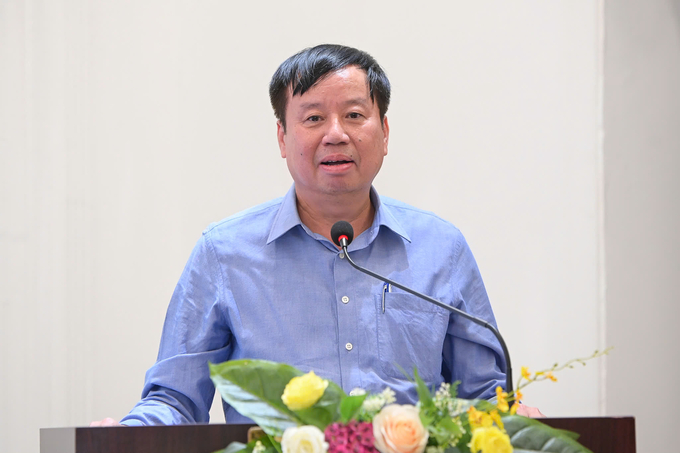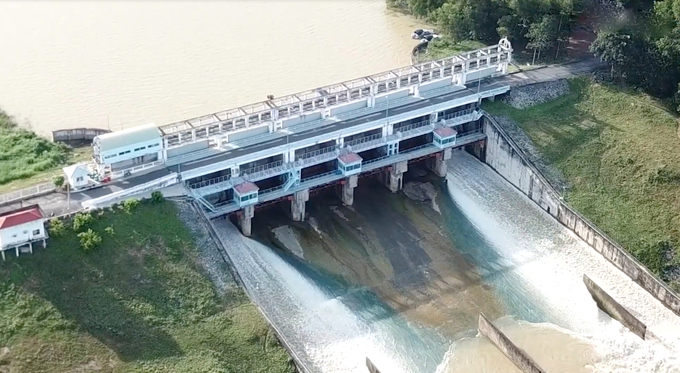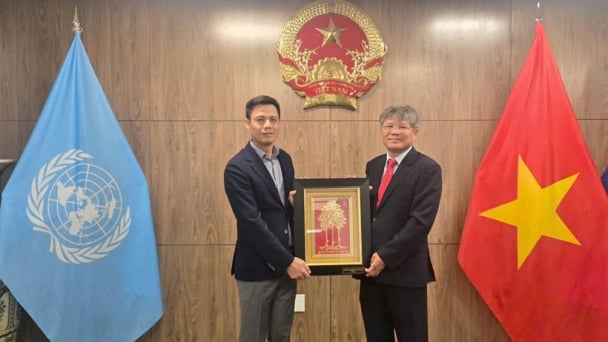May 21, 2025 | 19:32 GMT +7
May 21, 2025 | 19:32 GMT +7
Hotline: 0913.378.918
May 21, 2025 | 19:32 GMT +7
Hotline: 0913.378.918

Mr. Do Van Thanh, Rector of the Institute of Water Resources Planning speaking at the Forum on "Improving the effectiveness of information and warning, ensuring safe operation of irrigation dams and reservoirs in the new situation". Photo: Tung Dinh.
Mr. Do Van Thanh, Rector of the Institute of Water Resources Planning, provided an overview of the nation's irrigation reservoir systems, emphasizing notable advancements in the sector, which has an 80-year history of growth and development. Vietnam is among the top 10 countries worldwide for its excellent irrigation infrastructure.
Vietnam presently oversees roughly 8,000 dams and reservoirs, which include hydroelectric and irrigation systems, with a total water storage capacity of around 68 billion cubic meters. Among these, 7,315 dams and reservoirs, with a total capacity of 15 billion cubic meters, including significant structures such Cua Dat, Ngan Truoi, Ta Trac, and Dau Tieng.
The irrigation system is essential for managing 1.1 million hectares of agricultural output and preventing downstream floods, with an annual floodwater reduction capacity of around 1.5 billion cubic meters. These reservoirs provide multiple functions, including providing 1.5 billion cubic meters of water for home and industrial purposes, local producing power, facilitating solar energy initiatives, supporting aquaculture, enhancing tourism, and managing environmental water flows.
Mr. Thanh underscored the necessity of enhancing Vietnam's irrigation infrastructure. By 2030, irrigation planning anticipates the development of 31 new reservoirs to boost water storage by 1.91 billion cubic meters, with an enhancement of 360 million cubic meters through the repairs of 8 large reservoirs. The plans include establishing small, distributed reservoirs that will improve water supply to 300,000 hectares of agricultural land by 2030 and 600,000 hectares by 2050.
A tailored strategy is proposed for the Mekong Delta Region to create small-scale reservoirs to satisfy domestic and agricultural water requirements in resource-limited locations.
Notwithstanding its substantial contributions, the irrigation system has severe obstacles. Before the 2024 floods, more than 340 reservoirs sustained significant damage, and no funding was designated for their restoration. Numerous dams, beyond 30 years of age, are experiencing deterioration, with siltation and structural deficiencies impeding their efficacy.
Furthermore, several reservoirs have not been modified for multifunctional utilization, and the flood drainage capacity for downstream regions remains unevaluated for numerous critical infrastructures. Increasing flood occurrences and escalating agricultural water demand exceed the supply capacity of current reservoirs.
To tackle these difficulties and optimize the efficacy of Vietnam’s irrigation systems, Thanh suggested institutional strengthening, comprehensive planning, operational modernization, technology innovation, resource mobilization, and integrated solutions.
In particular, Thanh emphasized the necessity of improving rules and frameworks for the administration, investment, and safeguarding of reservoirs and dams to guarantee safety and operational efficacy.
Experts are anticipated to do comprehensive analyses to improve reservoir building and improvement strategies, revise operational protocols, and augment safety measures, especially for small and medium-sized reservoirs. The promotion of adaptable utilization of storage capacity above normal water levels is essential for enhancing flood avoidance and water management.

The irrigation reservoirs and dams in Vietnam have been crucial in enhancing agricultural output and socio-economic progress. Photo: VAN.
Furthermore, sophisticated technologies should be utilized in the planning, design, building, and operation of irrigation infrastructure; methods must be developed to attract varied investments for the sustainable utilization and maintenance of reservoirs. Establish reservoirs in regions with excess water, upgrade existing facilities to comply with technical specifications, and link reservoirs for enhanced management and increased service capacity.
The irrigation reservoirs and dams in Vietnam have been crucial in enhancing agricultural output and socio-economic progress. Through strategic investments, modernization, and proactive management, they may surmount existing constraints and persist as a foundation for sustainable growth amid climate change and shifting social demands.
According to the report of the Department of Water Resources, after the recent floods, some shortcomings in the reservoir bed, downstream areas of dams as well as operations have become more apparent. Currently, only 17% of reservoirs have developed emergency response plans; 5% of reservoirs have developed downstream flood maps. For reservoirs, especially large reservoirs with densely populated downstream areas, if plans are not developed when a situation arises, they will be very passive in response work.
Faced with the challenges of extreme floods and unpredictable developments in the context of climate change, pressure from people's activities, economic development in the upstream as well as downstream areas of dams and pressure to carry out the task of exploiting multi-purpose reservoirs, the Department said that there should be solutions for policy development and improvement.
Accordingly, the Department of Water Resources will advise the Ministry of Agriculture and Rural Development to coordinate with the Ministry of Industry and Trade, relevant ministries, untis and localities to develop a Decree amending and supplementing several articles of Decree 114 on the management of dam and reservoir safety to ensure strictness, efficiency, feasibility and compliance with legal regulations.
In addition, it is necessary to review and complete technical regulations, standards, and exploitation norms to serve the survey, design, construction and management of dams and reservoirs following new conditions
In addition, the Department will work with other departments and divisions under the Ministry to study and remove difficulties related to aquaculture activities in reservoirs; change tasks and technical parameters of works; handle works that have expired, are no longer in use, are severely damaged and cannot be repaired or restored, etc.

(VAN) VRG recently conducted a visit and working trip to the United States to demonstrate its efforts in redefining the role of rubber enterprises in the global value chain.

(VAN) In 2024, over 295 million people across 53 countries and territories faced acute hunger—an increase of almost 14 million people compared to 2023, while the number of people facing catastrophic levels of hunger reached a record high.

(VAN) World Environment Day 2025 (June 5) carries the theme 'Beat Plastic Pollution' continuing to emphasize the global urgency of addressing the plastic waste crisis.

(VAN) This was the assessment shared by experts at the workshop titled 'Assessing the Role and Potential of Low-Emission Rice Production Systems in Vietnam,' held on the morning of May 19.

(VAN) Cai Rong Port is the fisheries control center of Quang Ninh, helping to monitor fishing vessels, combat IUU fishing, and remove the EC's 'yellow card'.

(VAN) The German Agricultural Society (DLG) explores the possibility of establishing a mechanization service center in Vietnam’s Mekong Delta to support farmers in accessing and utilizing advanced machinery.

(VAN) On May 16, the Department of Water Resources Management, in collaboration with the Food and Agriculture Organization of the United Nations (FAO), held a signing ceremony for the GEF-8 project document.